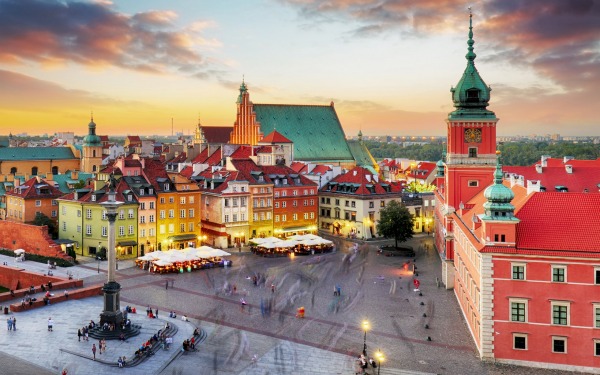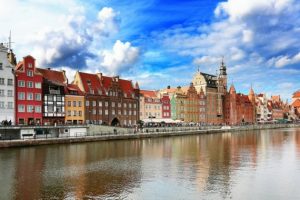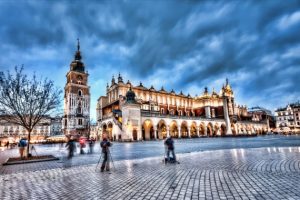Warsaw is the capital and largest city of Poland. The metropolis stands on the Vistula River in east-central Poland, and its population is officially estimated at 1.8 million residents within a greater metropolitan area of 3.1 million residents. Warsaw is an alpha-global city, a major international tourist destination, and a significant cultural, political and economic hub. Its historical Old Town was designated a UNESCO World Heritage Site.
Warnings & Dangers in Warsaw

OVERALL RISK : LOW
Warsaw is a very safe city to travel to. As elsewhere, petty thefts and pickpockets occur. Keep track of your belongings and be mindful of your surroundings.

TRANSPORT & TAXIS RISK : LOW
Public transport and taxis are reliable and safe. However, it is worth using only licensed taxi services, and in public transport, watch your pockets to avoid pickpocketing.

PICKPOCKETS RISK : MEDIUM
Pickpockets do happen but are not too common. Keep track of your belongings and your surroundings in tourist spots and on public transport. Keep track of your belongings in shopping malls and tourist crowds.

NATURAL DISASTERS RISK : LOW
In spring, Warsaw is prone to flooding due to rivers' flooding, but this does not happen often. Study the weather conditions before your visit here.

MUGGING RISK : LOW
The risk of serious robbery and armed attacks is shallow in Warsaw. There is little danger of these attacks in the suburbs. However, the likelihood that you will be attacked is minimal.

TERRORISM RISK : LOW
The risk of terrorism is low in Warsaw. As the European capital, Warsaw is susceptible to possible terrorist attacks. The global risk of terrorist attacks in public areas exists worldwide, so tourists should be vigilant.

SCAMS RISK : MEDIUM
The most common scams in Warsaw are related to street lotteries and fake fundraising. Be careful. Also, only withdraw money from ATMs at banks to avoid skimming your credit card details.

WOMEN TRAVELERS RISK : LOW
Women traveling alone can feel quite safe in Warsaw. The main thing is to adhere to the usual precautions and monitor your surroundings.
How Safe Is Warsaw for Tourists?
Warsaw is a fairly safe city to travel to.
The crime index is at a low level here.
The main problems are associated with vandalism and corruption.
Warsaw is generally a safe city.
There are many police officers in the city center, and it is usually a very safe area.
Bus and train stations attract homeless people and beggars, but they are usually not intrusive.
Violent behavior is sporadic, and if it does, it is most likely associated with alcohol and at night.
Although pubs and clubs are generally very safe, there can be fights in the surrounding streets, especially late at night.
Try to avoid confrontation.
Women and girls tend to be less vulnerable to assault or harassment, as the Polish code of conduct strictly prohibits violence (physical or verbal) against women.
Pickpocketing can sometimes be a problem, and you have to be careful to keep your belongings when in a large crowd or on buses.
Sometimes thieves operate on trains leaving the airport.
Avoid political and other demonstrations.
They sometimes clash with the police.
Tourists should be careful during football matches in Warsaw – fans can be aggressive and drunk.
Do I Need a Visa to Visit Warsaw?
A visa is not required for visits of up to 90 days in a 180‑day period for nationals of those countries for which the European Community has abolished the visa requirement. A valid passport is a must.
Which Currency Is Used in Warsaw?
The złoty is the official currency and legal tender of Poland. It is subdivided into 100 grosz.
How's the Weather like in Warsaw?
In Warsaw, the summers are comfortable and partly cloudy, and the winters are long, freezing, dry, windy, and mostly cloudy. The best time to visit Warsaw is between June and August.
What Do I Need to Know about Airports in Warsaw?
The major international airport in Warsaw is Warsaw Frederic Chopin Airport, located in Włochy, around 10 km away from the city center.
Should I Get Travel Insurance for My Travels?
A travel insurance policy is a must when visiting a foreign country or city. Make sure you got it before starting your journey; the customs officer may ask for it.
What Are Some Things to Do in Warsaw?
Warsaw is Poland’s vibrant capital and largest city in the country. Warsaw impresses with its history, nightlife, and high standards of restaurants situated on the Vistula River and sprawling across a vast area. There are many things to do in Warsaw: museums, restaurants, nightclubs, shopping outlets, breathtaking views and beaten track experiences that you shouldn’t miss when visiting Warsaw.
Is the Water in Warsaw Safe to Drink?
It is probably safe to drink tap water in Warsaw, but I would not recommend it.
Is Uber Safe in Warsaw?
There is an Uber taxi in Warsaw. You can call a taxi from the app on your phone. The cost of the trip will depend on the distance and time of day.




